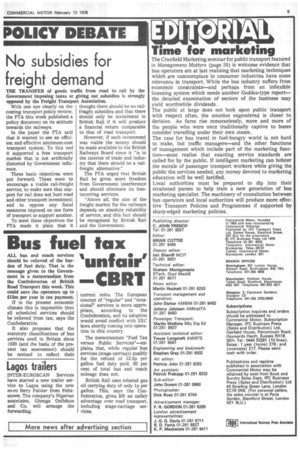Time for marketing
Page 7

If you've noticed an error in this article please click here to report it so we can fix it.
The Cranfield Marketing seminar for public transport featured in Management Matters (page 55) is welcome evidence that bus operators are at last realising that marketing techniques which are commonplace in consumer industries have some relevance in transport. While the bus industry suffers from economic constraints—and perhaps from an inflexible 'licensing system which needs another Geddes-type report— the detailed examination of sectors of the business may yield worthwhile dividends.
The public at large does not look upon public transport with respect often, the emotion engendered is closer to derision. As fares rise remorselessly, more and more of the people who were once traditionally captive to buses consider travelling under their own steam.
The case for bus travel in fuel-hungry world is not hard to make, but traffic managers—and the other functions of management which include part of the marketing func
tion—must realise •that exacting service standards are called for by the public. If intelligent marketing can bolster the morale of passenger transport workers while giving the public the services needed, any money devoted to marketing education will be well Justified.
Local authorities must be prepared to dip into their straitened purses to help train a new generation of bus marketing specialist. The machinery of consultation between bus operators and local authorities will produce more effective Transport Policies and Programmes if supported by sharp-edged marketing policies.




























































































